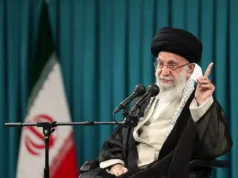Before Harold Rhode spent 28 years working in the Pentagon, most of the time advising secretaries of defense on the Muslim world, he had lived and studied in Egypt, Syria, Iran, Turkey, Jordan and elsewhere in the greater Middle East. Rhode had been a university student in Iran during that country’s Islamic revolution of 1978 – 1979. During those years he said he was “trying to find a way Jews and Muslims could live side-by-side in peace.”
He told a Jewish Policy Center webinar, “Misunderstanding Iran,” on April 17 that “I learned the languages” (Rhode speaks Arabic, Persian, and Turkish in addition to English, Hebrew and French) “and had experience in the field.” One thing he found was that “the values of the Old Testament, of Mt. Sinai … are not the values of the Muslim world.”
Failure to recognize the dichotomy is one reason U.S. policy toward Iran has been mistaken, Rhode said. America’s erroneous assumptions—including that the Iranian regime eventually will “let bygones be bygones” and split geo-strategic differences—also encourages the ayatollahs to expand their aggression. The latest glaring example has been Tehran’s drone, cruise missile and ballistic missile attack against Israel on April 13.
Like Chinese, Iranians with their 2,600-year-old civilization see themselves at the world’s center, Rhode said. China built its Great Wall to keep out nomads it regarded as “barbarians.” Persians—today’s Iranians—managed a far-flung empire for much of 1,100 years before Arabs, whom they regarded as uncivilized nomads, imposed Islam on them. The resultant long struggle between Shi’ite Islam, based in Iran, and Sunni Islam, centered on Saudi Arabia, has been one for cultural dominance and administrative supremacy, according to Rhode.
Instead of patiently playing history’s long game to achieve dominance and prove their beliefs are correct, “in the United States, Israel, we say ‘let’s work this out—you compromise a little, I compromise a little [and we can] get to an agreement.” But “Arabic has no concept like this,” Rhode cautioned. “Neither does Persian [Farsi].”
Western negotiators illustrated the pitfall in talks for the Obama administration’s 2015 nuclear weapons agreement with Iran, he said. “Every time the United Sates gave in … the Iranians would push it even farther.” Now, “the same is true under Biden.” When Western governments agree to negotiate, the mullahs “view you as weak.”
‘Compromise’ is a Dirty Word
To illustrate, Rhode said he once asked Arabic-speaking friends to come up with a translation capturing the American sense of “compromise.” The closest they got, he said, was a crude term for sexual submission. The idea of compromise “was absurd. How could you negotiate before you win?” One who agrees to talks instead of dictating terms is seen as a loser.
On the presidential campaign trail in 2020, Joe Biden castigated Saudi Arabia and its crown prince, Mohammad bin Salman, for the killing of critic Jamal Khashoggi in the kingdom’s consulate in Istanbul, Turkey. So, when Biden flew to Saudi Arabia in 2022 to ask Riyadh to increase oil production, bin Salman announced just before the president arrived that output would remain unchanged. Then he set a low-ranking official, a provincial deputy governor, to greet the American leader. Humiliation received, humiliation dealt.
During the Trump administration, U.S. Ambassador to Israel David Friedman devised the term “Abraham Accords” to describe peace agreements between Israel and the United Arab Emirates, Bahrain and Morocco, Rhode noted. This expressed the U.S., and Israeli, desire that the pacts symbolize a new era in the Middle East of Arab and Israeli, Jewish and Muslim comity. But Rhode said that Persian Gulf Arabs shun the term “Abraham Accords.” They use “defense accords” instead.
The Biden White House returned to the Obama administration’s policy of attempting to conciliate the Iranians. It urged Israel not to retaliate against Iran for its drone and missile barrage. But “the Saudis are petrified that Iran, if it gets nuclear weapons, will use them against Saudi Arabia,” Rhode said. “America is supposed to have an agreement to protect Saudi Arabia,” he pointed out. But when Iranian missiles hit Saudi oil facilities in 2019, “we did zero.”
So, the Saudis said to themselves, “if we can’t rely on the 800-pound gorilla, then maybe we can have the 250-pound gorilla … Israel,” Rhode said. “And they’re both allied against Iran.”
Hence the reported cooperation among Israel, Saudi Arabia, Jordan and others in defeating Iran’s attack against Israel, he added. That does not mean a long-term Israeli-Arab alliance is probable, Rhode said. “There are lots of discussions in the Muslim world [about] ‘how are we going to get Spain back?’” after the Christian Reconquista, which ended in 1492. Similarly, in a deeply-held Arab-Islamic view, “Israel is on occupied Muslim land, that must be Muslim forever.” But confronting a common Iranian enemy, the working relationship might hold so long as Israel is strong, he said.





